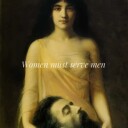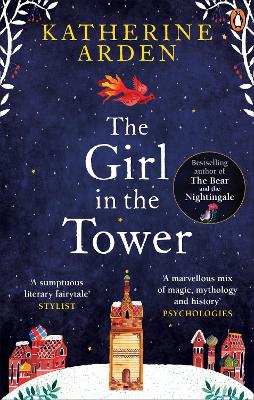
For a young woman in medieval Russia, the choices are stark: marriage or life in a convent. Vasya will choose a third way: magic. . .
The court of the Grand Prince of Moscow is plagued by power struggles and rumours of unrest. Meanwhile bandits roam the countryside, burning the villages and kidnapping its daughters. Setting out to defeat the raiders, the Prince and his trusted companion come across a young man riding a magnificent horse.
Only Sasha, a priest with a warrior's training, recognises this 'boy' as his younger sister, thought to be dead or a witch by her village. But when Vasya proves herself in battle, riding with remarkable skill and inexplicable power, Sasha realises he must keep her secret as she may be the only way to save the city from threats both human and fantastical. . .
A spellbinding fairytale full of magic and wonder, perfect for fans of Erin Morgenstern's The Night Circus and Philip Pullman's His Dark Materials.
*Make sure you've read all the books in the Winternight Trilogy*
1. The Bear and the Nightingale
2. The Girl in the Tower
3. The Winter of the Witch
- ISBN10 1473582245
- ISBN13 9781473582248
- Publish Date 30 January 2020 (first published 5 December 2017)
- Publish Status Active
- Publish Country GB
- Publisher Cornerstone
- Imprint Cornerstone Digital
- Format eBook (EPUB)
- Pages 384
- Language English
Reviews


Jo
Trigger and content warnings are under spoiler tags as there are quite a few of them.
Trigger/Content Warnings: This book features fire and arson, crossdressing/woman pretending to be a boy, transphobic undercurrents, slavery, burned bodies, abduction, threat of rape, forcibly removing a woman's clothing in public, sexual assault, stillbirth, and violence against women.
After absolutely adoring The Bear and the Nightingale, I desperately needed to continue with Katherine Arden's second book in The Winternight Trilogy, The Girl in the Tower. So I bought it as soon as I finished the first, and dived right in. And it was just as incredible as the first.
It starts with a prologue that starts exactly where The Bear and the Nightingale left off, with Vasya riding off into the forest towards Morozko's dwelling after leaving home for good. But then it jumps to Moscow and we get to see a little of Vasya's older sister Olga and her life in the terem as Princess of Serpukhov for a while, before jumping to the perspective of their older brother Sasha, who is a monk, and close adviser to the Grand Prince of Moscow, Dmitrii. The story follows him, Dmitrii and Dmitrii's men when they hear of bandits are burning down villages and stealing away young girls. After weeks of searching, they come across a young man who has rescued three young girls who have been stolen by bandits - but Sasha recognises this young man as his younger sister Vasya.
Then the story jumps back to follow Vasya in the weeks between her going to Morozko and turning up with the three girls she's rescued. Vasya has decided to be a traveller. She's turning away from convention and has decided to see all the things she's heard about, but would otherwise never get to visit. Morozko tries his hardest to dissuade her, but she is determined not to live the life ordained for her because of her gender - a wife or a nun. She wants to live. And so with supplies from Morozko, despite thinking better of it, off she goes - with the advice that if she meets anywhere along the way, she should pretend to be a boy, because it's not safe for a young woman to be out on her own.
I can't really talk too much about the rest of the story without spoiling things, but the story really picks up once Vasya joins Sasha and Dmitrii. There is at once both less and more of the magical than the first book in the trilogy. For a good while, the main focus is the bandits, who they are, where they girls are, and what's going on there. When things get back to Moscow, they get real interesting, because as Sasha's sibling, Vasya is also one of the Grand Prince's cousins, and he warms to her. And because of this, Sasha can't hide her away or send back home as soon as he would like.
There is a young woman cross-dressing/pretending to be a boy in this book, and I know people have issues with this trope. I don't know enough to really comment on this, so I will just state what I read. Vasya wears "men's" clothes simply because they're more suitable for travel and warmth than "women's". She's hiding away her hair for her safety. She uses the male version of her name - Vasilii - only when necessary for her safety. And it's for the exact same reasons of safety that Sasha, despite being completely scandalised and so angry with her, says she is his younger brother. Because in this world, at this time, a young woman on her own among the Grand Prince's men will be raped. This is just the given, accepted truth. If a woman is not at home with her family, or in a convent, then what is she doing? She is then fair game, and she's asking for it, basically. A woman must live within the strict boundaries the patriarchy has given her, or she deserves all she gets.
But believing her to be a boy, Dmitrii and his men treat her in a way she's never been treated before. It's for safety, but people thinking she's a boy brings so much freedom. Because there is no pretence in behaviour - just Vasya being herself with a different name - she finds herself accepted for who she is in ways she's never experienced before, because it's perfectly fine to be who she is, as long as she's male. So you can just feel how things are going to go terribly wrong - because for a girl to pretend to be a boy is shameful, even "unnatural" (transphobic undercurrents) and to deceive the Grand Prince so? It's just a catastrophe waiting to happen. In a way, I guess you could consider Vasya's story a real fantasy, because the life she lives, the things she does, would absolutely have not been accepted at that time.
Going back slightly to how she is treated as Vasilii and how she is treated as Vasilisa, there is a stark, stark difference. To be who she is as a woman is wrong. It's not right, it's not normal - it's not natural. And The Girl in the Tower further explores the accusations of being a witch that Vasya is on the receiving end of, because they have absolutely nothing to do with anything magical. The fact that she sees the chyerti and speaks with them, and her relationship with Morozko, aren't common knowledge - no-one knows. There's no superstition around the accusation. She is simply a witch because she doesn't act the way a woman should. She isn't meek and mild, she isn't quiet and reserved, she isn't content looking after the home and mending. She's bold and brave. She has passion and strength. She's wild. She's a witch.
I used the word "relationship" earlier in regards to Morozko, but I don't want to give the wrong impression; it's not a romantic relationship - at least not yet. But Morozko is definitely feeling some things he was not expecting at all. And it's really not good for him at all. Morozko narrates small parts of the story, and we find out more about him; how he came to be and why, his immortality, how magic works in regards to his existence. And the effect Vasya has on him. He needs her specifically, needs her to wear the necklace he created, in order to keep living, but she's changing him in ways he did not foresee, in ways that could be hazardous. I do really like Morozko, there's so much mystery about him, so much we don't know, but I can't help be drawn in by him. He's not exactly a villain, but he does have his own motivations, and he is Death, pretty much! But he's also kind and caring, and I do think he's kind of lonely. And it looks like there's a lot more to Vasya, as well, in regards to what she's capable of, so much she doesn't know, but we get glimmers of through Morozko's reactions. And I am so intrigued! I am intrigued by where her story will go, what will happen between her and Morozko, and finding out more about him. But it's quite obvious where their relationship will head, and it's possible people may have issues with that due to the fact that he's been around for centuries, and she's a teenager.
I absolutely adored The Girl in the Tower, and I am so incredibly excited to read the third and final book in the series, The Witnter of the Witch, but also really sad, because I don't want this series to end!

abookishblether
The writing is more like poetry than any other book that I have read. It is this quality that gives the book such a vivid atmosphere and strong characterisation. The audiobook was a fantastic addition to my reading experience as it added to the atmosphere that the book built and kept me immersed in the story.
While I found the first book to be a little slow, the pace of the second book kept increasing until the finale kept me on the edge of my seat.
I would really recommend this series.

Kate (Blogging with Dragons)
Vasilisa, known as Vasya, not only saves herself and her family throughout the series, but also innocent maidens, the undeserving, and the fallen. She even shatters false gods, while breathing life into the dying chyerti, or magical guardians, of the Rus world—which has grown so preoccupied with its icons and religious doctrines of late that their own magic that has protected them for years is rapidly dying.
“It is going to end, Vasya thought. One day. This world of wonders, where steam in a bathhouse can be a creature that speaks prophecy. One day, there will only be bells and processions. The chyerti will be fog and memory and stirrings in the summer barley.”
Vasya defeats not only the supernatural beings that threaten her loved ones and her precious freedom, such as the Umpyr or vampires, and evil sorcerers that wish to ensnare her and bind her life force, but also battles with equally detestable and deadly foes—the customs of her time period.
The Girl in the Tower begins with Vasya fleeing her home from the first novel on the back of her beloved stallion, Solovey, a gift from the Winter King, Morozko. Disguised as a boy, Vasya no longer fears the title of witch that often clings to her and threatens her very life. That is, until she is engulfed in the world of Moscow, the politics of her cousin Grand Prince Dmitrii, her brother monk, Sasha, and her sister Princess Olga. It is only a matter of time until her deception, abetted by her older brother and sister, of being a boy is discovered, and the title of witch claims her again once more.
I read fiercely to discover what would happen next and was ensnared by this tale of fallen priests, fading guardians, sorcerers, frost kings, bandits, horse races, Tartars, and more—all set amongst a breathtakingly real backdrop of medieval Moscow, and complete with descriptions of traditional dress and customs. The many layers of The Girl in the Tower are simply astounding and the possibilities for Vasya—or at least for her male disguise—seemed endless, with new and old characters entering the fray.
I was both dismayed and delighted to rediscover Konstantin, the destroyed priest from The Bear and the Nightingale in Moscow. Author Katherine Arden does an amazing job of simultaneously rendering the man despicable and pitiable. I was thrilled when Vasya at last vowed to kill him the next time she lays her green eyes upon him and I cannot wait to read of their meeting in the next novel, as its clear by the prophecy given to him by the bannik, that his devious actions are far from over.
I was similarly pleased with Sasha’s reappearance in this novel. I thought it was somewhat odd that Vasya’s beloved older brother Sasha disappeared to become a monk in the first novel, so I was delighted when he appeared again in this novel. Arden delicately sets Sasha, who looks startlingly similar to Vasya, up as a foil for his younger sister—brilliantly highlighting the difference their genders make. Under the auspices of a monk—Sasha is able to wander the realm with a sword on his back, reaping fame as both a man of God and as the sole trusted political advisor to his cousin Grand Prince Dmitrii—and has no immediate plans to take his vows to remain in cloistered in his monastery for good.
This is in stark contrast to Vasya, who as a woman, must either have an arranged marriage or remain ensconced in a convent for the rest of her days—something that all the other characters in the book recognize will crush her spirit, but are unable to find a suitable alternative to within the constraints of her own time period. Vasya is never given the freedom of choice like her brother—who is able to opt to roam the world of his own volition and is actually respected for it—and it is a testament to her strength of will that she does not follow the path set out for her by her own time period and family, but instead, blazes her own trail.
I was surprised to find that this novel explained some of the mystery surrounding Vasya’s grandmother, Tamara, who was very much like her granddaughter. I found her depiction as a ghost-wraith-bound to Kasyan a bit disappointing, as from the beginning of The Bear and the Nightingale, Vasya’s mother swears her next child, will be special, like her own mother. So to see Tamara, rendered low by the chain of events that happened to her was startling, and made Morozko’s similar actions all the more disturbing. Despite this smidge of dismay, I was excited by the references to Tamara’s own magical mother. The very same woman who rode firebirds, like the one Vasya frees from the golden bridle of Kasyan. I wondered, could Tamara’s mother be Baba Yaga—the witch from the Russian fairytale that is casually referenced in each novel? This would also explain some of the hints the author set, with the appearance of Midnight, the notorious demon, and the lines the novel foreshadowing that Vasya should have paid more attention to these references to her great-grandmother, as it would have saved her a great deal of trouble in the future.
But out of all these simultaneous running threads of storylines throughout the novel, I’m most excited to see what becomes of the romance between Vasya and Morozko, the Frost King Death God. Though I was dismayed to learn that Morozko, who clearly loves Vasya as much as he is able to as a frozen god of death, had somewhat imitated villain Kasyan’s evil actions by giving Vasya her sapphire jewel, which would keep him alive through her love and life force—albeit with better intentions—I still really love their relationship. My ability to see the relationship in a positive light is a testament to the author’s incredible writing ability to render all of her characters complex and conflicted. This is especially true of her characterization of Morozko.
It’s been riveting from the very beginning of the series to watch the King of Winter’s concern for Vasya and for her well being to grow. And to see him time and time again show up to save Vasya from certain death—unable to let her die, despite being the very god of death—feels like a victory in more than one way. To see his tenderness with her as something he honestly cannot help is touching and his immortality being an impediment to being with her is beautifully heartbreaking.
“With that sapphire, he bound your strength to him—but the magic did what he did not intend; it made him strong but it also pulled him closer and closer to mortality, so that he was hungry for life, more than a man and less than a demon….So that he loved you, and did not know what to do.”
I love his magical home in the fir grove, to which Vasya runs as a safe haven. I love that Vasya does not have to compromise herself when she is with him—she refuses his dowry in the first novel, and refuses his sapphire in this one—but he still cares for her. His magical white mare –the mother of Vasya’s own Solovey—and her concern over both Vasya and Morozko’s fates is entertaining. Truly the horses are the wisest characters in these novels—something I find purely delightful.
The romance of Vasya and Morozko is so uniquely bewitching that I can only hope the two can find their own happy existence together somehow. Regardless of their outcome, the theme of the novels continually make clear is that there is no traditional future in store for Vasya. I’m very much hoping that her future will include Morozko—the two on their magical horses, watching over the fates of men and chyerti alike—but I have a feeling that there are more surprises in store the next novel—and that Vasya will ride out to meet them.
Book Review Policy
Connect with Me:

HekArtemis

annieb123
The Girl in the Tower is the second book in the Winternight Trilogy by Katherine Arden. Published by Random House - Ballantine in ebook, hardback and paperbound formats, it was released 5th December, 2017.
I had devoured the first book in the series, The Bear and the Nightingale, and looked eagerly forward to the next book(s). This one certainly lived up to the promise of the first book. The author's facility with plotting and characterization are flawless. The prose is ethereal and powerful at the same time. These books have a sense of timelessness and almost dreamlike fairy-tale feeling. I loved the gravitas with occasional glimpses of puckishness of ageless Morozko and especially the interactions between them and between Solovey and Vasya. I also LOVED it that Vasya is strong and brave (and it sometimes costs her dearly). She is honorable and kind and a wonderful role model.
There is an aching beauty in the writing and the book was just a completely enchanting read from first to last. I could not imagine enjoying it more.
Five stars, wonderful wonderful book. Can't wait for the third book, The Winter of the Witch, due out in 2019.
Disclosure: I received an ARC at no cost from the author/publisher for review purposes.

gmcgregor
In pursuit of a mysterious group of bandits that has been stealing children, Vasya finds herself unexpectedly reunited with her brother Sasha and the Crown Prince of Moscow to whom he is sworn in service, Dmitrii. When she gets back to Moscow with them, she's also reconnected with her older sister Olga, now the wife of an important nobleman, and meets Olga's daughter, Marya, who seems to share Vasya's unusual ability of seeing things beyond the ordinary. Vasya's trying to keep her masculine identity intact until she can get on her way while also enjoying the ability to express her naturally bold personality...and then, of course, disaster strikes and the family finds themselves fighting supernatural forces to stay alive.
The Bear and the Nightingale was one of my favorite reads of 2017, and this sequel (the second in a trilogy) did not disappoint. I will say that I'd recommend reading it shortly after the first book, or while it's still relatively fresh in your mind...there's very little of the kind of "catching the reader up" exposition that many sequels have, and I wish I'd known that going in because I'd read the first nearly a year prior so the details were a little fuzzy. But the magic is still there! Arden's prose and storytelling remain deft, she expands further into the realm of Slavic folklore, and I love how she grows the seeds of romance she planted in The Bear and The Nightingale between Vasya and Morozko. I found myself rooting for them even though Arden never lets you forget the inherent power imbalance between an immortal creature and a teenage girl. It's refreshing to see a romantic plotline with a young woman who won't apologize for her desire to finish becoming herself.
While there are many books I read that I enjoy, it's pretty rare that something really grabs me and keeps me up late at night and makes me want to buy extra copies to give to people and force them to read it (honestly, I have a really hard time recommending books to people in real life because so much about whether a person will enjoy a book depends on taste). This series makes it into that group, for me. They're just flat-out great storytelling. I'd highly recommend this and the other Winternight books to all readers!

Quirky Cat
I’m going to say it right now; I think this book has officially made it into my favorite books of the year list. I absolutely loved it! The cover alone is utterly stunning, and if I’m being honest that is what caught my attention to begin with. I’ll confess that I had not read the Bear and the Nightingale before reading this (I didn’t know it was a trilogy until after I started, and by then I was too into it to put the book down), but honestly it’s so strong and informative that it stands up very well on its own (though I’m definitely going back to read the first novel next!).
This was a truly enchanting tale; using a massive infusion of Russian mythology to bring the fantastical world to life (and as a side note; there’s a glossary in the back of the book to explain all of the creatures mentioned!). I’ve always been interested in reading fantasy stories with a Russian influence (their faerie tales are wonderful), but they seem to be few and far between (in my experience at least). For this reason alone the Girl in the Tower was a treasure to me, but there are so many other magnificent points about it as well.
I loved the shifting balance in this novel, sometimes it felt almost like a faerie tale (such as when Vasya is with her horse Solovey) and other times the story is very much rooted in the real world (such as the dangers of mortal men). There’s a touch of romance in this story as well; though it is more of the unrequited love feel than anything else (how else can things go, between a mortal and an immortal?). There’s so much emotion wrapped up into these characters, it’s easy to forget we’re merely staring at the pages of a book.
The Girl in the Tower touched upon many real life points as well – how noble women (and women in general for that matter) during that time were treated; how limited their options truly were. We’re shown how rough the winters could be, how dangerous raiders are to small towns, and how easily men are brought to betrayal. We’re shown that men that claim to be wise and pious can be corrupted, bringing about more danger than they should be able to. All these elements combined together to create a truly breathtaking and frightening conclusion.
The characters are so well designed in this story, especially Vasya (the main character). She’s bright and stubborn, determined, and brave in ways one can only hope to be themselves. It sounds like she’s been through quite a lot already (again, I haven’t read the Bear and the Nightingale, but I was able to gather a lot of the events based on context), and yet she’s still going. Vasya is the daughter of a lord, this naturally limits what she’s allowed to do or how she’s allowed to act; yet she’ll have none of that. Determined to make her own path in life, Vasya decides to become a traveler (though she accedes to the advice of a good friend and dresses as a boy, for her own safety).
In a way I’m lucky that I haven’t read the Bear and the Nightingale yet, as now I have something to read while I wait for the third novel (The Winter of the Witch) to come out. But it won’t be long before I join the ranks of those anxiously awaiting the next book to drop.
For more reviews, check out Quirky Cat's Fat Stacks

chymerra
I enjoyed the 3 separate but intertwined storylines that made up the book. They detailed how life was in medieval Russia. From the opulent courts of Russia to the drudgery of being a peasant, the author did a great job bringing them alive. The 3 storylines are all connected to one person, Vasya. Vasya is the backbone of this book.
I loved Vasya in this book. She was strong. I am not talking about psychical strongness either. She was mentally strong. She had to be, considering what she had gone through in the last book and what she went through in this book. She made decisions, while not always right, were right for her. She knew her mind in a time where women were considered chattel. That made her a very dangerous person to men. I got why she didn’t reveal that she was a girl when she was leading the Prince to the barbarians. She would have to conform to their rules. I get it and I admire that the author chose for her to go that path.
The love story between Vasya and Morozko was very interesting. On one hand, I could see why the author didn’t progress it beyond a few kisses. I got it. It would be weird. But I wished that it did. I do agree with Morozko’s mare when she told him to forget Vasya. But he couldn’t leave her alone. He was feeling things for her that a frost demon/death god shouldn’t feel. That made it dangerous for him because he became more human.
The end of the book was heartbreaking but uplifting at the same time. I do think that Vasya should have been more upfront with Sasha and Olga about what exactly happened to her father and stepmother. That would have saved a lot of heartbreak on all sides. But, Vasya did redeem herself and was given a great honor by Olga. I can’t wait to read book 3.
The Girl in the Tower is a mystical read. I was taken on a journey through medieval Russia with all its lore. This is a wonderfully written story that will keep you glued to the book. I am thankful that the author included a glossary and an afterward about Russian names. I was a little confused about the different names each person was called and that afterward summed it up perfectly. This is a book that I will read again in the future and I cannot wait to read book 3.
Will I reread: Yes
Will I recommend to family and friends: Yes
Age range: Older teen
Why: Violence. No language or sex. There is a very explicit scene of a woman giving birth to a stillborn baby.
I would like to thank Katherine Arden, Random House Publishing Group, Del Ray and NetGalley for allowing me to read and review The Girl in the Tower.
All opinions stated in The Girl in the Tower are mine
**I chose to leave this review after reading an advance reader copy**

Beth C.
As this is a sequel, it would be helpful to read the first book in the series before reading this one. Much of the character development - particularly for Vasya - happens in that book. However, it is not absolutely necessary. Both books are beautiful in their own right, and well worth reading.
I think this book will end up being a Top 5 for the year for me. It's just that good.
